A rooster wakes me up at around 4:00 AM and the sun is nowhere in sight. Surely, this rooster is blind. I try to sleep some more until the sun actually decides to rise at around 5:45 AM. It was probably awoken by the rooster as well, but managed to hold
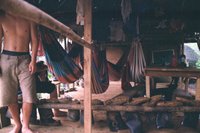 out a little longer than me. I get up and start to notice the pain and cramps that the inclined sleep on hard soil provoked. Walking over to the dinning area I notice some people are still asleep, most of them in carefully placed hammocks. I have never been able to sleep on those death traps, so I’ll take the painful floor any day.
out a little longer than me. I get up and start to notice the pain and cramps that the inclined sleep on hard soil provoked. Walking over to the dinning area I notice some people are still asleep, most of them in carefully placed hammocks. I have never been able to sleep on those death traps, so I’ll take the painful floor any day.The community has been wide-awake cooking breakfast for us. Today’s meal is boiled yucca and eggs. “Yucca?” Asks Nicole from the small state of Connecticut in the United States. I imagine most of the group will be tasting new flavors on this trip. Yucca is a tough root that can be eaten boiled or fried or mashed. It’s fairly starchy and a good source of carbohydrates. Everyone tastes their breakfast and seem content with the meal. I gather the group enjoys the yucca, so far.
After breakfast, we are divided into several groups to take on different tasks. One Spanish speaker will be placed in each group to translate for the rest of the members. The translators included myself, Michael, Annie, and Marta, a Spanish speaker from Spain. I don’t recall exactly what the other groups are arranged to do, but it includes cleaning brush and collecting wood around the farm. My group is composed of Polly, Matt, Whitney, and Zoë. Whitney hails from Connecticut and I would find out her work ethic includes chatting and singing to keep energetic. It’s curious, since
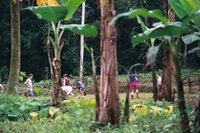 Panamanian farmers use a series of yelps to animate their work for the same purpose. Zoë comes from England and her work ethic involves a witty humor bursting with sarcasm. We are set to clean the banana plantation of dead and sick leaves. And so we climb down the muddy hill with machetes in hand.
Panamanian farmers use a series of yelps to animate their work for the same purpose. Zoë comes from England and her work ethic involves a witty humor bursting with sarcasm. We are set to clean the banana plantation of dead and sick leaves. And so we climb down the muddy hill with machetes in hand.The Bananas trees are sad and dirty. Their leaves are brown with a fungus and the ground overridden with weeds. Our job is to clean up this scene. The weeds must be cut up or pulled from the ground and collected, while dead or sick banana leaves must be cut and collected. Nicolas explains that leaves that are partially sick can be cut at just that point to prevent spreading the fungus. Almost like amputating a gangrenous limb. We divvy up the jobs in such a manner that while one cuts the other collects the organic waste. I put on my fingerless gloves and grab a machete.
I cut my finger while wearing fingerless gloves. It is not a deep wound, almost like a nasty paper cut, but it is bleeding. I forfeit the machete and realize that fingerless gloves are useless in this scenario. Also it seems much safer to gather stuff that has already been cut. I take a break to go back up the hill to wash out my minor wound. Nicolas had foreseen such instances and brought with him a first aid kit. Thankfully, so had I and a few other group members. I protect the cut with a bandage and feel fit to get back to work. I return and happily proceed to pick up organic trash.
It’s lunchtime. We are exhausted and welcome rest. At the top of the hill we are served
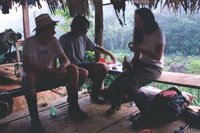 yucca with egg and onions this time. To most, it seems like the same meal we had for breakfast, but no, this one includes onions. That’s half an extra ingredient! Desert includes fresh papaya and sweet mango. We take a relaxing and quite break. But we suddenly realize that only half the day has gone by and that’s when Nicolas calls us back to work.
yucca with egg and onions this time. To most, it seems like the same meal we had for breakfast, but no, this one includes onions. That’s half an extra ingredient! Desert includes fresh papaya and sweet mango. We take a relaxing and quite break. But we suddenly realize that only half the day has gone by and that’s when Nicolas calls us back to work.This time we rotate our shifts and are set to fortify the walls of a fishpond. The job seems simple enough, take dirt from the inside and reinforce the walls on the perimeter. Of course, no one takes into the account the backbreaking job that is digging and the amount of earth it takes. We do the job happily yelping away with the local kids, some of who are a third my age and can work much better than me. Most of
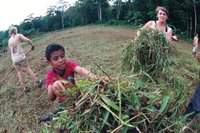 them begin helping on the farm as young as 4 years old! They don’t have good access to a formal education. Otherwise, their parents tell me, they would be in school instead of the fields. They tell me that the Ministry of Education isn’t doing its job out here and it seems it doesn’t really care.
them begin helping on the farm as young as 4 years old! They don’t have good access to a formal education. Otherwise, their parents tell me, they would be in school instead of the fields. They tell me that the Ministry of Education isn’t doing its job out here and it seems it doesn’t really care.Jubencio, Treasurer of the farm, tells me that they have a small shack that operates as the school for the entire community up to grade six. Education is compulsory in the Republic of Panama, but one cannot go to a school that has no teacher. Apparently, the teacher is not from the community and she arrives and goes as she pleases even though she has accommodations. Jubencio explains that on a particular week that the teacher actually chooses to show up, she only teaches on three days; Tuesday, Wednesday, and Thursday. I ask him if they have petitioned the authorities. He describes their ordeal, which included several appeals to the Ministry. The community’s appeals are futile, as the teacher is connected with members in the Ministry, therefore she is untouchable. Such is life in the tropics.
It is 4:00 PM and Nicolas whistles us to stop working. We sort our tools and head for the river. It is cold, but very refreshing. Most take this opportunity not only to relax, but also to wash themselves and their clothes. In a short moment, rain begins to pour.
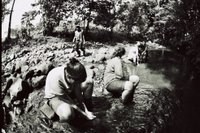 That could have helped during the working hours, I think to myself. We leave the river as dusk begins to creep in. At the top of the hill we change into almost-dry clothes and hang our wet ones. In this humidity nothing is ever really dry. We gather at the table and stare at the white stalks of yucca on the plates. It’s dinnertime.
That could have helped during the working hours, I think to myself. We leave the river as dusk begins to creep in. At the top of the hill we change into almost-dry clothes and hang our wet ones. In this humidity nothing is ever really dry. We gather at the table and stare at the white stalks of yucca on the plates. It’s dinnertime.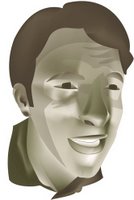
No comments:
Post a Comment